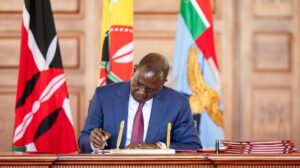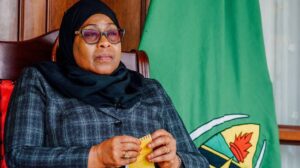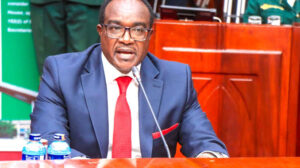Moses Kuria’s recent transition from Trade Cabinet Secretary to economic advisor within President William Ruto’s Council of Economic Advisors (CEA) has not shielded him from public scrutiny.
This change came amid his alleged involvement in a high-profile KSh12.2 billion sugar importation deal between the Kenya National Trading Corporation (KNTC) and Invest Africa FZE, a Dubai-based company.
The timing of this deal has raised questions, as Kenya’s sugar sector is currently under investigation due to several scandals, including accusations of improperly sanctioned sugar imports and instances of contaminated product releases into the market.
While Kuria no longer holds a cabinet position, his ties to Invest Africa FZE have persisted as a major issue.
During his time as Trade CS, Kuria was linked to numerous large-scale importation deals for essential commodities such as sugar, rice, and edible oils, which he claimed were intended to lower consumer prices amid high inflation.
Critics, however, have highlighted the lack of transparency in the awarding of these contracts, often to companies with which Kuria had alleged personal or professional connections.
The sugar contract with Invest Africa FZE stands out not only due to its value but also because of the potential conflict of interest.
As Trade CS, Kuria had the authority to influence procurement decisions within the KNTC, a body intended to manage Kenya’s strategic commodity reserves.
By allegedly favoring companies he was associated with, Kuria is suspected of undermining fair competition in the sector.
This echoes criticisms he faced regarding edible oil imports, where he purportedly pushed KNTC to contract specific suppliers under the pretext of breaking monopolies held by local companies.
Further concerns surround Kuria’s actions during the controversial edible oils contract, where he defended KNTC’s procurement of billions of shillings worth of oils from specific international firms.
Here, he justified his choices as efforts to curb inflation and ensure fair competition but faced accusations that the tender processes lacked proper oversight.
Some local businesses argued that his policies unfairly favored foreign companies while sidelining Kenyan producers, a claim he denied by asserting that former market leaders were monopolizing the sector.
In his new advisory role, Kuria is now charged with supporting economic recovery strategies, including the Bottom-Up Economic Transformation Agenda (BETA), a plan focused on alleviating poverty and enhancing local production.
However, his previous controversies follow him, as the public and opposing parties demand greater accountability regarding procurement practices and alleged conflicts of interest.
With ongoing investigations, there is rising pressure to reassess Kenya’s public procurement policies, aiming to restore public confidence and ensure transparency in government contracts.





















Add Comment